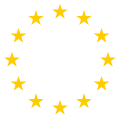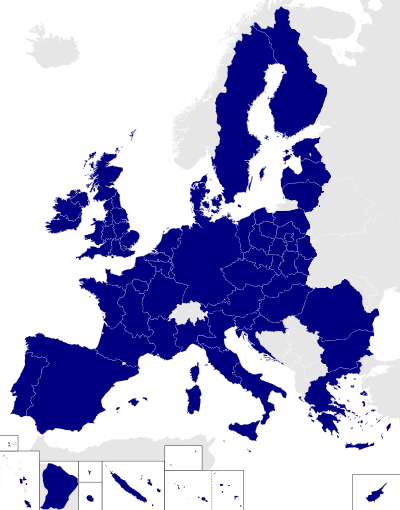European Commissioner for Trade
| European Commissioner for Trade | |
|---|---|
| Appointer | European Parliament[1] |
| Term length | Five years |
| Inaugural holder | Jean Rey |
| Formation | 1958 |
| Salary | €19,909.89 per month[2][3] |
| Website | European Commission |
The European Commissioner for Trade (sometimes referred to as the EU Trade Commissioner) is the member of the European Commission responsible for the European Union's (EU) common commercial policy (governing international trade). The portfolio has been held by Cecilia Malmström (Sweden – FP / ALDE) since November 2014.
Responsibilities
The Commissioner heads up the Directorate-General for Trade in defining the commercial policy of the EU, which has been exclusively under the EU's mandate since the EEC's Rome Treaty in 1957. Due to the size of the European economy, being the world's largest market and having a huge slice of world trade, this position can be very important in dealing with other world economic powers such as China or the United States. Former Commissioner Leon Brittan commented that “Frankly, it is more important than most [national] cabinet jobs”.[4]
The Commissioner defines the trade interests of the EU and negotiates bilateral, regional or multilateral agreements with third countries. She monitors the implementation of such agreements and deals with any unfair practices, devises and monitors internal and external policies concerning international trade, ensures consistency in EU external policies and provides up-to-date public and industrial economic information.[5]
WTO
| European Union |
 This article is part of a series on the |
Policies and issues
|
The European Union (although, due to the legal structure of the EU, it was known as the European Communities at the WTO until 1 December 2009) is a member of the World Trade Organization (WTO) in its own right since the WTO was founded on 1 January 1995, alongside its member states. The EU forms its own customs union with a common external tariff and commercial (external trade) policy: this means that at the WTO the EU operates as a single actor with the European Commission representing the EU.[6]
EU trade policy is decided by the Article 133 committee (EU trade policy is based on Article 133 of the EU treaties) which brings together the Commission and member states to decide policy. Actual negotiations are carried out by the Commission's Directorate-General for Trade under the authority of the Trade Commissioner.[7] However, current plans for the European External Action Service (EEAS) may see trade and WTO relations being transferred from the Commission over the EEAS and the High Representative.
At the WTO, the EU has been in a large number of trade disputes with other members, notably the US (see European Union – United States relations). The EU has brought 81 cases to the WTO, had 67 brought against it and been a third party in a further 88 (as of March 2010).[6]
Commissioners
Malmström (2014-ongoing)
Cecilia Malmström became the new Commissioner for Trade in late 2014. The mission letter for her new post mentioned the successful conclusion of the controversial trade negotiations with the USA, the Transatlantic Trade and Investment Partnership (TTIP), as one of her key duties, but with a number of restrictions and confinements to the negotiation mandate to address European public concerns over TTIP.[8] The confinements were the result of the hearing in the European parliament a few weeks before, where she had to face some tough questions over the TTIP negotiations. She tried to revive the negotiations with the USA two weeks after entering office.[9]
De Gucht (2010-2014)
Karel De Gucht was appointed Commissioner for Trade in 2010. De Gucht's statements to the European Parliament ahead of becoming Trade Commissioner were met with dismay by Trade Justice campaigners who claimed 'responses at his three-hour hearing revealed his corporate sympathies and gave little indication that the change of personnel at the European Trade Commission will lead to any change in the direction of European trade policy.'[10]
De Gucht criticised China for undervaluing the renminbi and the US for protectionism and incoherence over the Doha round.[11] This further came after EADS pulled out of a US defence contract bid, that it had previously won before it was reopened, claiming the tender process was biased against them.[12][13]
During his five-year term as the Commissioner for Trade, De Gucht achieved important trade agreements, among others, with South Korea (2011), Colombia and Peru (2013), Central America, Singapore, Georgia, Moldavia and Ukraine (2014). The comprehensive trade agreement with Ukraine was a direct cause of the upheavals in Independence Square and the 2013–14 Ukrainian Crisis. In October 2014 he concluded CETA, the free trade agreement with Canada and the first ever agreement with a G7 member. He also concluded landmark economic partnership agreements with West Africa (ECOWAS), South Africa (SADC) and Eastern Africa (EAC), covering together 75% of African economy. The signature of the trade agreement with the EAC, consisting of Burundi, Kenya, Rwanda, Tanzania and Uganda, was his ultimate duty, done in Nairobi on 31. October 2014, his last day in office as the European Commissioner of Trade.
He left office while several trade negotiations were still ongoing. He oversaw the start of trade negotiations with Japan and Vietnam, resumed talks with Mercosur and began investment agreement negotiations with China. He also prepared and launched free trade negotiations with the United States, the Transatlantic Trade and Investment Partnership (TTIP), in 2013.
At the end of his mandate he enjoyed a strong reputation within the European Commission because of the progression in the trade portfolio during his mandate and because of his strong views on European policy questions.[14] On the other hand, side he had to deal with some criticism in the general public and the media because of the apparently intransparent European negotiation mandate in the ongoing TTIP trade negotiations with the USA, which gave rise to a number of rumours. The concerns were partially relieved after the negotiation mandate was released to the public in October 2014.[15]
Ashton (2008–2009)
Catherine Ashton was nominated by Gordon Brown as the UK's EU Commissioner on 3 October to replace Peter Mandelson[16] and appointed on 6 October as the new Trade Commissioner.[17] Although a life peer, she does not use her title Baroness Ashton of Upholland as an EU Commissioner.[18] On 1 December 2009 Ashton became the new High Representative and Benita Ferrero-Waldner took over Trade until the second Barroso Commission was in place.
Mandelson (2004–2008)
At his hearing at the European Parliament in 2004, Peter Mandelson expressed a desire to develop multi-lateral rule-based trade, benefiting the poor as well as helping general economic development. He has been noted for being a pro-European and an Atlantacist.[19]
Concluding WTO talks after the collapse of the Doha Development Round has been a contentious point, with the EU not willing to cut agricultural subsidies without similar action by the United States.
In July 2007, he proposed the creation of European golden shares to protect certain European companies, such as EADS from foreign takeovers. The Commission has generally been against golden shares as they distort the Union's internal market, the idea is that EU golden shares would protect companies from outside influence but not other European companies.[20]
Mandelson stated that he did not intend to seek another term in the Commission after 2009[21] and in 2008 he stood down to join the British cabinet as Business secretary. Although his tenure was supported by business representatives in Brussels in light of his advocacy of free trade, his departure was generally welcomed by development NGOs and fair trade campaigners who viewed his attitude towards developing countries as aggressive, supporting European big business over development goals.[22]
List
See also
- Commerce minister
- Directorate-General for Trade
- Foreign relations of the European Union
- Economy of the European Union
External links
References
- ↑ Malmström was proposed by the Swedish Government, with the post of Trade Commissioner being assigned by Jean-Claude Juncker. The whole Commission was approved by the European Parliament.
- ↑ REGULATION No 422/67/EEC, 5/67/EURATOM OF THE COUNCIL, EurLex
- ↑ Base salary of grade 16, third step is €17,697.68: European Commission: Officials' salaries – accessed 19 March 2010
- ↑ The New Commission – Some initial thoughts BM Brussels
- ↑ Commissioner: Mandate, European Commission
- 1 2 MEMBER INFORMATION: The European Union and the WTO, WTO – accessed 18 March 2010
- ↑ EU and WTO, EU Delegation to Japan
- ↑ Malmström Mission Letter as the Commissioner for Trade of the Juncker Commission, (2014-11-01) - accessed (2014-11-27)
- ↑ Malmström attempts to revive EU-US trade talks, EU Observer (2014-11-18) - accessed (2014-11-27)
- ↑ http://www.wdm.org.uk/european-parliamentary-hearing-europe%E2%80%99s-new-trade-commissioner
- ↑ Willis, Andrew (19 March 2010) De Gucht criticises China and US on trade, EU Observer
- ↑ "Northrop and EADS exit tanker bid". BBC News. 9 March 2010.
- ↑ "EU concern over end of tanker bid". BBC News. 9 March 2010.
- ↑ Exit interview De Gucht
- ↑ Reaction after the public release of the EU TTIP negotiation mandate, EC Press release (2014-10-09) - accessed (2014-11-27)
- ↑ Chaffin, Joshua; George Parker (4 October 2008). "EU president backs trade role for Ashton". Financial Times. Retrieved 6 October 2008.
- ↑ http://ec.europa.eu/trade/issues/pr061008_en.htm
- ↑ "Catherine Ashton, EU Trade Commissioner, Trade website". European Union. 2008. Retrieved 9 October 2008.
- ↑ Opening statement for European Parliament Hearing European Commission
- ↑ 'Golden share' could protect EU companies from takeover: Mandelson EU Business, 23 July 2007.
- ↑ Mandelson to step down as EU commissioner The Guardian
- ↑ Phillips, Leigh (3 October 2008) Trade commissioner Mandelson resigns, EU Observer
.jpg)


